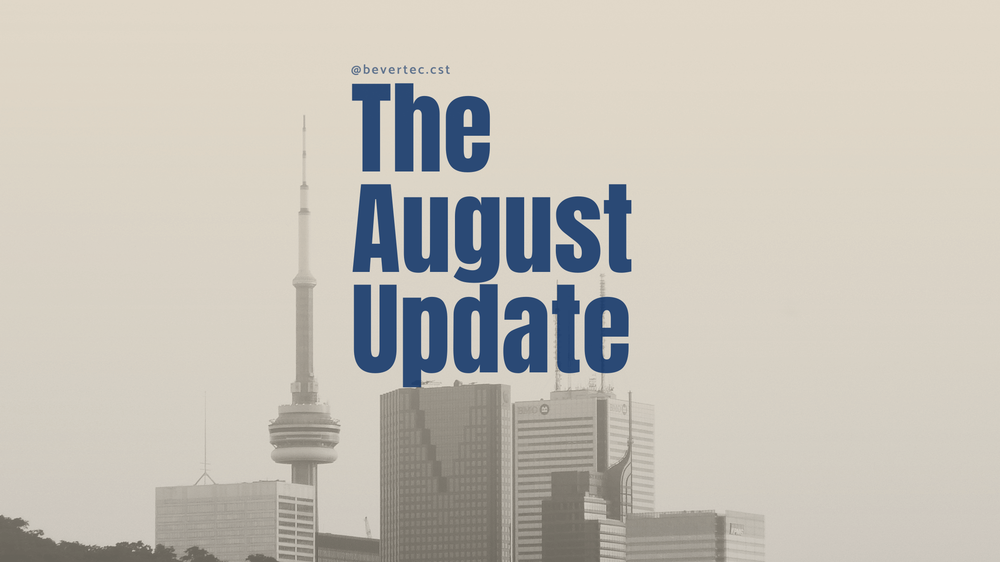The August Update

In August 2023, the Canadian workforce witnessed a continued expansion, with the total employment figure reaching 20,113,000. Over the course of the year, employment has shown a steady increase, averaging 25,000 new jobs each month since January 2023.
After experiencing a sustained period of stability at 5.0% for five consecutive months between December 2022 and April 2023, the unemployment rate in August inched up to 5.5%. This represented the third consecutive monthly uptick, commencing from May 2023.
Examining the year-over-year data, there was a notable 4.9% growth in average hourly wages, amounting to $33.47 in August. This follows a 5% rise observed in July.
Employment Gains by Industry
In the month of August, the professional, scientific, and technical services sector recorded a noteworthy surge in employment, marking a gain of 52,000 jobs. This increase effectively counterbalanced the cumulative decline witnessed from March to July 2023. Looking at the year-over-year perspective, this industry witnessed a notable growth of 67,000 jobs in the preceding month.
Furthermore, the construction sector observed a rise in employment by 34,000, partially offsetting the decline of 45,000 positions noted in July.
The category encompassing Other Services, which includes personal repair services, also witnessed a substantial uptick of 21,000 jobs.
Moreover, the transportation and warehousing industry experienced a boost in employment, adding 13,000 positions in the past month.
Growth Led by Provinces and Territories
In August, Alberta experienced a notable increase in employment, with a growth of 18,000. This marked the second consecutive increase for the province. Meanwhile, the unemployment rate in the province decreased by 0.4% to 5.7%. In a year, employment in Alberta has increased by 99,000 and coincided with fewer job vacancies posted.
Employment in British Colombia increased by 12,000, making it the first significant increase within the province since September 2022.
In Ontario, employment held steady for a second consecutive month and in Prince Edward Island, employment increased by 1,8000.
Recruitment Trends
The Canadian job market is in a constant state of evolution, adapting to economic shifts, technological advancements, and changing societal preferences. As we delve into the recruitment trends of August 2023, it becomes evident that several key factors are influencing the way both job seekers and employers approach the hiring process.
Remote Work Dominates: The COVID-19 pandemic accelerated the adoption of remote work, and this trend continues to shape recruitment in Canada. Employers are increasingly open to hiring talent from across the country, and even globally, as remote work becomes standard practice for many organizations. Job seekers are also leveraging this newfound flexibility to explore opportunities beyond their geographic location.
Diversity and Inclusion Prioritized: Canadian companies are making concerted efforts to diversify their workforce. Diversity and inclusion have become central to recruitment strategies, with organizations actively seeking candidates from a variety of backgrounds, including gender, ethnicity, and socioeconomic status. Many companies are also implementing blind recruitment processes to mitigate bias.
Data-Driven Decision-Making: Data analytics are playing an increasingly important role in recruitment. Companies are leveraging data to identify top-performing employees, predict candidate success, and streamline the hiring process. Data-driven insights are helping recruiters make more informed decisions, reducing time-to-hire and cost-per-hire.
Artificial Intelligence in Screening: AI-powered tools are becoming increasingly popular for initial candidate screening. These technologies can analyze resumes, assess skills, and even conduct initial interviews, saving recruiters time and resources. However, there are ongoing discussions about the ethical use of AI in recruitment to avoid bias and ensure fairness.
Focus on Employee Well-being: Job seekers are not only looking for the right job but also a supportive work environment that promotes well-being. Companies are highlighting their commitment to employee mental health and work-life balance in their recruitment efforts. This approach helps attract and retain top talent.
Lifelong Learning and Development: With the rapid pace of technological change, the expectation of continuous learning is prevalent in the Canadian job market. Companies are offering robust training and development programs to help employees upskill and stay relevant in their roles.
Virtual Onboarding and Engagement: Virtual onboarding and engagement practices, which gained prominence during the pandemic, remain essential. Employers are investing in technology to create seamless remote onboarding experiences, ensuring that new hires feel connected and supported from day one.
In conclusion, the recruitment trends in the Canadian job market for August 2023 reflect a dynamic landscape where flexibility, skills, diversity, sustainability, and technology play pivotal roles. Job seekers and employers alike are adapting to these changes, fostering a more inclusive and innovative approach to talent acquisition. As the Canadian workforce continues to evolve, staying updated on these trends is crucial for both job seekers and organizations seeking to thrive in this ever-changing environment.
At Bevertec, our dedication revolves around uniting outstanding professionals with employers, a crucial element in nurturing a positive shift within the Canadian employment landscape. We are motivated to bridge gaps and harmonize highly skilled individuals with visionary enterprises, igniting advancement and creativity in the constantly changing job sector.




